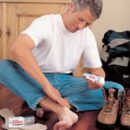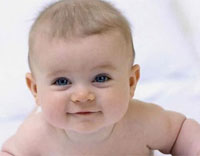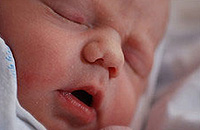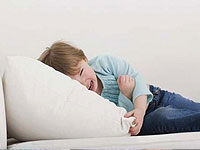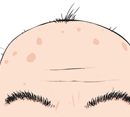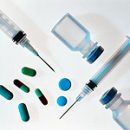Your child has no teeth, whether it is normal? What to do if teething teeth gives a child a lot of unpleasant sensations? When to start brushing teeth to a child? Answers you will find in the article.
Content
Anna Mikhailovna Solovyova, a dentist, Candidate of Medical Sciences, Associate Professor of the Department of Children's Dentistry and Prevention of SPbgm, is responsible for parents. Pavlova.
Question number 1. Son at 9 months has no tooth. It develops normally. What should we do?
Milk teeth usually begin to break off at 6-8 months. Your first birthday, a one-year-old kid, as a rule, is celebrating, having four top and bottom cutters in the mouth. For two years, the first milk molars and fangs are broken. Second milk molars appear in another six months. Full formation of a dairy dentition is usually completed in three years.
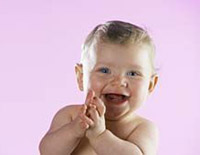 What to do, if by 9 months your child has not yet cut down? First of all, you should not worry ahead of time. The delay in the teething of temporary teeth within 6 months dentists consider quite natural. At the same time, boys tend to teet later than girls.
What to do, if by 9 months your child has not yet cut down? First of all, you should not worry ahead of time. The delay in the teething of temporary teeth within 6 months dentists consider quite natural. At the same time, boys tend to teet later than girls.
Start with the fact that carefully examine the gums of the baby: it is very likely that they look swearing and reddened, or, on the contrary, the gums are thin and pale, and under it it is trying and even visible the edge of the tooth. In order to speed up the rubber, buy special ring toys - teething rubber stimulants. Useful and easy gum massage with clean finger or cold teaspoon. The pressure on the gum facilitates and speeds up the teething of the teeth, and the cold reduces the unpleasant feeling.
Violation of the timing of teething can be caused by the overall growth of growth against the background of a number of child diseases, first of all, when rickets. Meet the pediatrician: perhaps your baby needs vitamins or calcium preparations to maintain normal mineral exchange.
In rare cases, children have adenatia - the absence of teeth aden. So if the baby has been for more than a year, and his teeth have not yet begun to cut off, it is worth seeking to consult a dentist. You can check the availability of dentigates using an X-ray image. X-ray irradiation may be unsafe for the children's body, so this study should be carried out only if necessary and for the appointment of a doctor. Today it is possible to reduce the harmful effect of X-ray rays, if you take a picture using a radio photo. Such equipment is usually available in each modern equipped dental clinic.
Question # 2. Our daughter (1 year 2 months) is a very cheerful and cheerful child, but in the period of teething, she sleeps badly, wakes up every hour and shouts to hoarseness. Is it really so worried about the teeth or for it lies a more serious reason?
Teething can really be accompanied by increased excitability: the child becomes restless, capricious, often with crying wakes up at night, may refuse food. At the same time, the kid drags in the mouth any item, since chewing reduces itching irritated gums. Sharply reinforced saliva selection, which, emerging from the mouth, can cause skin irritation. Often, a limited region of red and rash appears on the cheek from the teething tooth. The temperature in the child can rise to subfebrile values (within 37.8°). However, the fever does not necessarily accompanise the teething.
Against the background of teething, one or another infection can develop. Therefore, when the baby appears, such symptoms such as nausea, vomiting, ear pain, diarrhea, cough, rash, resistant loss of appetite or high temperature, you need to see a doctor.
What means soften pain? The simplest is cold. Cold makes it easier and reduces swelling. If this does not help, can be used to lubricate the gum dental gel or ointment containing anti-inflammatory and painkillers. If necessary, you can give a child an anesthetic drug. Apply any drug drugs should only be appointed by a doctor.
Question number 3. Our daughter is 2 years old. The teeth had white and healthy teeth, but lately began to darken and collapse. Tell me what's the matter?
Immediately after teething, the teeth of the child are subject to aggressive exposure to the external environment. Microbes are settled on the teeth, forming a film of the dental. Acids are actively produced in dental. Under their influence, the enamel of dairy teeth is easily destroyed, and carious cavity is formed.
Acid production is particularly actively in the presence of sugar. Therefore, the cause of the development of caries in the first years of life is often the early transition to artificial feeding, especially if a child sucks sweet milk mixes or horn juices for a long time.
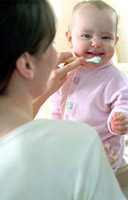 Bring to regular care of the oral cavity is still needed before teething. With the help of a moisturized hygienic napkin, dressed on a clean finger, carefully wipe the mucous membrane of the cheeks and gums. Recently cutting the cutters at first also wipe the napkin.
Bring to regular care of the oral cavity is still needed before teething. With the help of a moisturized hygienic napkin, dressed on a clean finger, carefully wipe the mucous membrane of the cheeks and gums. Recently cutting the cutters at first also wipe the napkin.
In the second year of life it is time to start using a toothbrush. Today on sale there are special toothbrushes - they are small and have a particularly soft bristle. Funny bright toys adorning the handle of this brush, form a positive attitude to the cleaning of the teeth.
Up to two years we recommend parents to clean the kid tooth just a damp toothbrush. From two years you can start using toothpaste. Best if it is a paste containing fluorine. It should, however, remember that a small child is inclined to swallow toothpaste during cleaning, so under 6 years old it is better to use children's toothpastes with reduced fluorine content. For one-time cleaning, it is enough to use a small amount of fluorine toothpaste - the size of the pea.
The risk of early development of caries is increased with insufficient fluorine content in drinking water. Such a situation takes place, for example, in Moscow and St. Petersburg. Children from 2 to 14 years old need compensation for the daily rate of fluoride admission to the body. The recommended daose dose of reception of sodium fluoride in the form of tablets or droplets should determine for your child a pediatrician or a children's dentist.


